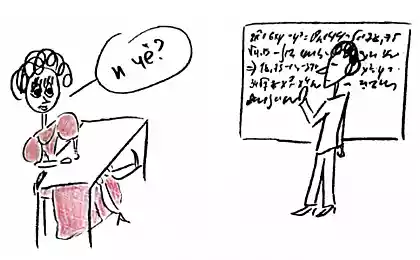1205
12 scientific evidence to the obvious facts
Some scientific experiments are striking in their boldness and revolutionary spirit, scope and other care, and still others, oddly enough, predictable results and of dubious value from a scientific point of view. Justification commonplace and obvious laws are presented by some researchers with such aplomb that automatically start to doubt their competence or sincerity. In this collection you'll find a dozen great famous facts to prove that scientists have spent a lot of time.
1. Cats ignore their masters

Recently, the staff of the University of Tokyo made the "discovery" that a long time know without exception, owners of Cats: domesticated felines recognize the voice of their masters, but almost do not react to their team.
The reason for this lies in the peculiarities of evolutionary development: unlike dogs, learned to serve the people, domestic cats kept their hunting instincts that cause them not to rush to respond to external stimuli, and to hide their intentions.
2. Students who do homework, get higher marks

Economist Nick Rapp, apparently not too well in school, otherwise he would not have to carry out the experiment on the effect of homework on achievement.
Rapp has divided his students into two groups: one for some time did not engage in the given home exercises, while others diligently to solve them. The findings are unlikely to surprise anyone - the second group of students performed better than the control tests and receive their higher scores on the basis of which the researcher concluded that "homework plays an important role in the educational process." Who would have thought!
3. Men stare at women's breasts
In his article, «My Eyes Up Here» (translated as "My eyes are here") Sarah Gervais brings a truly "sensational" data from it during one of the experiments: the man in conversation with a woman, usually more looks at her figure than watching a person.
Using the technology of tracking eye movement, Sarah found that more attractive than the proportions of the female body, the more "wandering" on it look male companion. Women in conversation with each other behave in much the same: they are looking at the figure of the interlocutor, appreciating it as a potential competitor in the fight for male attention.
4. High heels are uncomfortable and harmful

Stiletto heels visually enhance the growth of women and make them more attractive gait, but the fair sex know that walking on them can be a real torture.
The damage from the frequent wearing of high-heeled shoes is confirmed by research experts from the American Institute for the Study of aging: its employees found that 64% of elderly women complaining of pain in the legs, within a few years long walk in high heels.
The "value" of such surveys is staggering: on the negative effects associated with high heels doctors repeat for several decades, in addition, do not be tempted to American expert to understand: if long walks in these shoes hurt his feet, it is unlikely to mean that it is useful.
5. Pigs like to wallow in the mud

Everyone knows that pigs often hold a "mud bath". Scientists believe that the reason for this was the absence of sweat glands, providing effective cooling of the body, and this is true, but there is an interesting nuance.
A recent study, published in the journal "Applied science of animal behavior» («Applied Animal Behavior Science») revealed that modern pigs no sweat glands just because their ancestors are constantly lying in the dirt and do not need other ways thermoregulation.
So, initially it was the cause of addiction to the pigs' mud treatments. " Be sure to waste time to prove that pigs wallow in the mud, because I always liked to do it?
6. When you walk with any woman a man is slower than alone

Staff at Pacific University, Seattle showed that men adjust to the pace of walking the woman he loved, but the rest of humanity is so clear - the one for which "like a stone wall", used to walk faster, but does not want to bother her fragile "soul mate" forcing her to run, especially if the passion on his heels. In addition, since the walk becomes longer and contributes to a more fruitful dialogue.
The experimental results indicate about the same thing: men instinctively slowed down to conserve energy Lady and thus increase its ability to conceive children.
Interestingly, the company of men moves slightly faster than the average, the participants one by one, if a man walks with a girl-friend, there is a tradeoff - it slows down a little, and she slightly faster pace.
7. cornflakes with milk tastes better than water

Scientists from the Pontifical Catholic University of Chile found a striking phenomenon: it turns out, if you add to the corn flakes water instead of milk, they are not as tasty, with experts even know why this is happening.
The fact that "as a result of the intermolecular reaction water weakens the structure of the flakes, which results in the dissolution of some of their components and mechanical integrity failure", in other words, flakes absorb water and become soft sticky mess, so they have been not so good. And the fat contained in milk, prevents flakes to absorb a lot of moisture, so they remain crisp and tasty.
8. Overeating leads to weight gain

According to the large-scale study of American doctors from the 1970s, the average weight of an adult resident of the United States increased by about 7, 5 kg.
In 2009, at the European Congress on Obesity Head experiment Boyd Algernon Charles Swinburne publicly stated that "a growing weight of American citizens can be attributed to increased caloric intake", thus preventing all possible misunderstandings on this issue.
9. Assembly distract team members from working

In 2005, US scientists have discovered "remarkable" pattern: frequent meetings and planёrki spoil the mood of the staff and not allow them to work in peace.
After analyzing the diaries 37 university employees, experts have found that even the most patient and determination of them consider the endless meeting a waste of time that workers' collective could have spent more usefully. Proof of this is the fact that because of the tedious assembly and "debriefing" of even the most diligent of workers is markedly reduced performance.
Instead, the study, by the way, the Americans could turn to their Russian colleagues - our experts have long known than the dangerous party meeting and "calls on the carpet».
10. Reading is useful for the brain

Remember, a teacher at the school said that if a lot of reading, you can become smarter? Surely you will not be surprised to learn that it has received approval of scientific justification.
The group of experts with the help of magnetic resonance imaging to examine the functioning of the brain several volunteers during reading fiction and textbooks, while it became clear that in both cases the blood flow to the brain increases, increasing the efficiency of its operation. It is interesting that reading literature of different types stimulate different areas of the brain.
Leader experiment Natalie Phillips summarized the result: "Reading is a wonderful exercise for the brain," what I feel like saying: "Thank you, Cap».
11. Students disadvantaged schools often drink alcohol

A team of researchers from the Harvard School of Public Health has spent this unique experiment as much as 14 years, but the result is worth it: because they have learned that in schools, "famous for" multiple parties and drinking bouts school and college students, teens actually drink more.
Experts interviewed more than 50 thousand 120 students from different schools and colleges, and it turned out that, despite the renewed each year the composition of classes, the number of teens abusing alcohol in them remains almost unchanged.
12. Internet surfing killing time

The Internet is a tool for achieving the goals, but if you had been there any way of time, you know - people are more likely to use it at all for writing doctoral theses or acquaintance with the invaluable cultural heritage of humanity: most users see in it a way to take the time or throw out negative energy.
Employees of the US research organization «Pew Research Center» have revealed that about 53% of people aged between 18 and 29 years old at least once a day, surf the Internet without a specific purpose, and among Internet users of the older generation such, there are about two thirds. By the way, Is the reading of this collection for the purpose of your Internet surfing originally?
1. Cats ignore their masters

Recently, the staff of the University of Tokyo made the "discovery" that a long time know without exception, owners of Cats: domesticated felines recognize the voice of their masters, but almost do not react to their team.
The reason for this lies in the peculiarities of evolutionary development: unlike dogs, learned to serve the people, domestic cats kept their hunting instincts that cause them not to rush to respond to external stimuli, and to hide their intentions.
2. Students who do homework, get higher marks

Economist Nick Rapp, apparently not too well in school, otherwise he would not have to carry out the experiment on the effect of homework on achievement.
Rapp has divided his students into two groups: one for some time did not engage in the given home exercises, while others diligently to solve them. The findings are unlikely to surprise anyone - the second group of students performed better than the control tests and receive their higher scores on the basis of which the researcher concluded that "homework plays an important role in the educational process." Who would have thought!
3. Men stare at women's breasts
In his article, «My Eyes Up Here» (translated as "My eyes are here") Sarah Gervais brings a truly "sensational" data from it during one of the experiments: the man in conversation with a woman, usually more looks at her figure than watching a person.
Using the technology of tracking eye movement, Sarah found that more attractive than the proportions of the female body, the more "wandering" on it look male companion. Women in conversation with each other behave in much the same: they are looking at the figure of the interlocutor, appreciating it as a potential competitor in the fight for male attention.
4. High heels are uncomfortable and harmful

Stiletto heels visually enhance the growth of women and make them more attractive gait, but the fair sex know that walking on them can be a real torture.
The damage from the frequent wearing of high-heeled shoes is confirmed by research experts from the American Institute for the Study of aging: its employees found that 64% of elderly women complaining of pain in the legs, within a few years long walk in high heels.
The "value" of such surveys is staggering: on the negative effects associated with high heels doctors repeat for several decades, in addition, do not be tempted to American expert to understand: if long walks in these shoes hurt his feet, it is unlikely to mean that it is useful.
5. Pigs like to wallow in the mud

Everyone knows that pigs often hold a "mud bath". Scientists believe that the reason for this was the absence of sweat glands, providing effective cooling of the body, and this is true, but there is an interesting nuance.
A recent study, published in the journal "Applied science of animal behavior» («Applied Animal Behavior Science») revealed that modern pigs no sweat glands just because their ancestors are constantly lying in the dirt and do not need other ways thermoregulation.
So, initially it was the cause of addiction to the pigs' mud treatments. " Be sure to waste time to prove that pigs wallow in the mud, because I always liked to do it?
6. When you walk with any woman a man is slower than alone

Staff at Pacific University, Seattle showed that men adjust to the pace of walking the woman he loved, but the rest of humanity is so clear - the one for which "like a stone wall", used to walk faster, but does not want to bother her fragile "soul mate" forcing her to run, especially if the passion on his heels. In addition, since the walk becomes longer and contributes to a more fruitful dialogue.
The experimental results indicate about the same thing: men instinctively slowed down to conserve energy Lady and thus increase its ability to conceive children.
Interestingly, the company of men moves slightly faster than the average, the participants one by one, if a man walks with a girl-friend, there is a tradeoff - it slows down a little, and she slightly faster pace.
7. cornflakes with milk tastes better than water

Scientists from the Pontifical Catholic University of Chile found a striking phenomenon: it turns out, if you add to the corn flakes water instead of milk, they are not as tasty, with experts even know why this is happening.
The fact that "as a result of the intermolecular reaction water weakens the structure of the flakes, which results in the dissolution of some of their components and mechanical integrity failure", in other words, flakes absorb water and become soft sticky mess, so they have been not so good. And the fat contained in milk, prevents flakes to absorb a lot of moisture, so they remain crisp and tasty.
8. Overeating leads to weight gain

According to the large-scale study of American doctors from the 1970s, the average weight of an adult resident of the United States increased by about 7, 5 kg.
In 2009, at the European Congress on Obesity Head experiment Boyd Algernon Charles Swinburne publicly stated that "a growing weight of American citizens can be attributed to increased caloric intake", thus preventing all possible misunderstandings on this issue.
9. Assembly distract team members from working

In 2005, US scientists have discovered "remarkable" pattern: frequent meetings and planёrki spoil the mood of the staff and not allow them to work in peace.
After analyzing the diaries 37 university employees, experts have found that even the most patient and determination of them consider the endless meeting a waste of time that workers' collective could have spent more usefully. Proof of this is the fact that because of the tedious assembly and "debriefing" of even the most diligent of workers is markedly reduced performance.
Instead, the study, by the way, the Americans could turn to their Russian colleagues - our experts have long known than the dangerous party meeting and "calls on the carpet».
10. Reading is useful for the brain

Remember, a teacher at the school said that if a lot of reading, you can become smarter? Surely you will not be surprised to learn that it has received approval of scientific justification.
The group of experts with the help of magnetic resonance imaging to examine the functioning of the brain several volunteers during reading fiction and textbooks, while it became clear that in both cases the blood flow to the brain increases, increasing the efficiency of its operation. It is interesting that reading literature of different types stimulate different areas of the brain.
Leader experiment Natalie Phillips summarized the result: "Reading is a wonderful exercise for the brain," what I feel like saying: "Thank you, Cap».
11. Students disadvantaged schools often drink alcohol

A team of researchers from the Harvard School of Public Health has spent this unique experiment as much as 14 years, but the result is worth it: because they have learned that in schools, "famous for" multiple parties and drinking bouts school and college students, teens actually drink more.
Experts interviewed more than 50 thousand 120 students from different schools and colleges, and it turned out that, despite the renewed each year the composition of classes, the number of teens abusing alcohol in them remains almost unchanged.
12. Internet surfing killing time

The Internet is a tool for achieving the goals, but if you had been there any way of time, you know - people are more likely to use it at all for writing doctoral theses or acquaintance with the invaluable cultural heritage of humanity: most users see in it a way to take the time or throw out negative energy.
Employees of the US research organization «Pew Research Center» have revealed that about 53% of people aged between 18 and 29 years old at least once a day, surf the Internet without a specific purpose, and among Internet users of the older generation such, there are about two thirds. By the way, Is the reading of this collection for the purpose of your Internet surfing originally?























